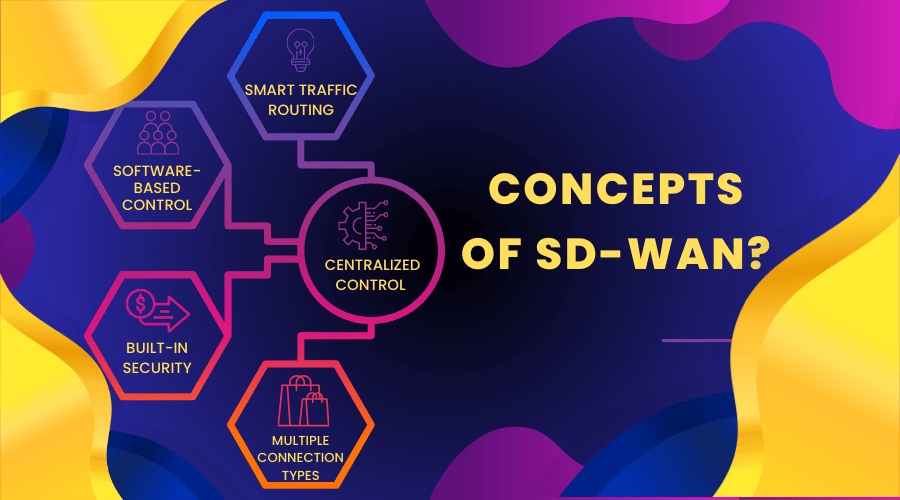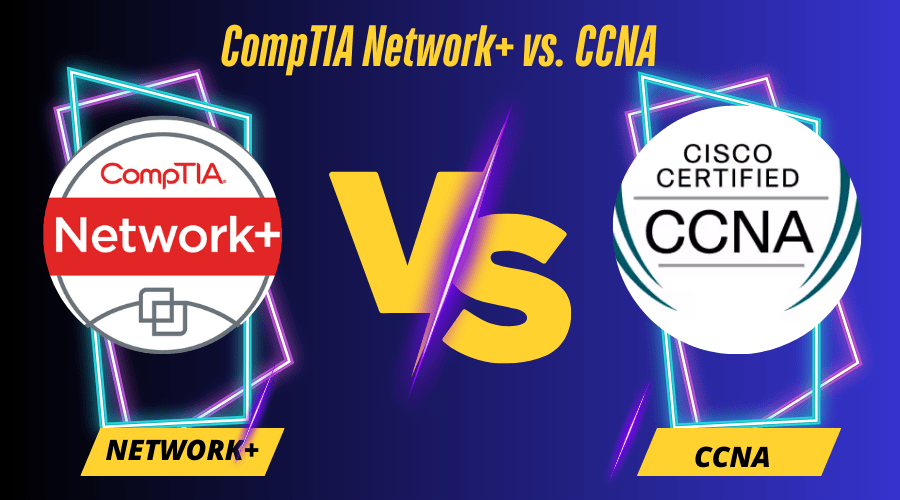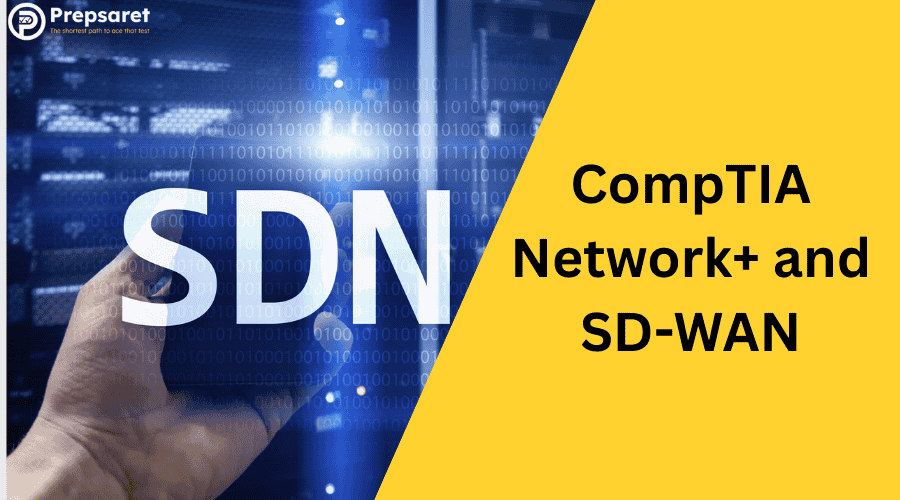The rise of SD-WAN (Software-Defined Wide Area Networking) is reshaping modern networking — and if you’re preparing for the CompTIA Network+ certification, understanding SD-WAN is a major advantage. This article explores how SD-WAN concepts connect with Network+ exam objectives, including how this knowledge is applied in real-world IT environments.
Want to prepare for the CompTIA Network+ exam with confidence? Prepsaret offers the best practice exams, detailed study notes, and up-to-date resources to help you pass the certification on your first try!
What Is SD-WAN and Why It Matters
Software-Defined Wide Area Networking (SD-WAN) has become a game-changer in the networking world! If you’re working in IT or studying for your Network+ certification, this is one technology you’ll want to get familiar with.
SD-WAN is basically a smarter way to connect offices, data centers, and cloud services across different locations. Unlike older networking methods that were rigid and hardware-heavy, SD-WAN uses software to control everything, making networks more flexible and easier to manage.
For companies, SD-WAN means better performance, lower costs, and simpler management. For IT pros like you, understanding SD-WAN can open doors to exciting job opportunities and higher salaries.
What Are the Concepts of SD-WAN?

SD-WAN stands for Software-Defined Wide Area Network. At its heart, it’s a new approach to building and managing networks that connect multiple locations.
The main concepts of SD-WAN include:
- Software-Based Control: Unlike traditional networks where each device needs individual configuration, SD-WAN manages everything through a central software platform. This means you can control your entire network from one dashboard!
- Smart Traffic Routing: SD-WAN understands what kinds of applications are using your network. It can automatically send your video conference through the fastest path while routing less urgent traffic through cheaper connections.
- Multiple Connection Types: SD-WAN can mix and match different internet connections like broadband, cellular, and private lines to create a super-reliable network.
- Built-in Security: Modern SD-WAN includes security features right in the package, protecting your data as it travels across the internet.
Understanding these SD-WAN networking fundamentals will give you a solid foundation both for your CompTIA Network+ exam and for working with this technology in the real world.
Traditional WAN vs. SD-WAN
Traditional WANs and SD-WANs take very different approaches to connecting your business locations. Let’s see how they stack up:
Traditional WAN:
- Uses expensive MPLS (Multiprotocol Label Switching) lines
- Changes require manual device configuration
- Limited visibility into network performance
- Complex to set up and manage
- Slow to adapt to changing conditions
SD-WAN:
- Can use any connection type (including cheaper internet)
- Centrally managed through software
- Provides detailed analytics and monitoring
- Adapts automatically to network conditions
- Faster to deploy and easier to scale
What is the difference between WAN and SD-WAN? Traditional WANs rely heavily on hardware and fixed connections, while SD-WANs use software to intelligently manage traffic across multiple paths.
Which are two benefits of using SD-WAN? First, significant cost savings by reducing reliance on expensive MPLS connections. Second, improved application performance through intelligent path selection and traffic prioritization.
Key Components of an SD-WAN Architecture

CompTIA Network+ exam topics related to SD-WAN deserve special attention, as they represent the evolution of the certification toward modern networking. A complete SD-WAN solution consists of several important components working together:
- SD-WAN Edge Devices: These are the physical or virtual appliances located at each branch office, data center, or cloud environment. They handle the actual routing of traffic and enforce policies.
- Centralized Controller: This is the “brain” of the SD-WAN. It provides a single interface to manage all policies and configuration across the entire network.
- Orchestrator: This component handles deployment, configuration updates, and monitoring across all SD-WAN devices.
- Analytics Platform: Provides visibility into network and application performance, helping identify issues before they affect users.
When examining what are the key components of Cisco SD-WAN architecture specifically, you’ll find they include vManage (for management), vBond (for orchestration), vSmart (for control), and vEdge (edge routers) — though terminology varies between vendors.
Organizations can choose between vendor-specific implementations like Cisco’s, VMware’s VeloCloud, or open-source options. Each has its advantages depending on your existing infrastructure and specific needs.
Related post: Top CompTIA Network+ Books
Is SD-WAN Included in the CompTIA Network+ Certification?
As networking technologies evolve, so does the CompTIA Network+ certification. The latest versions of the exam have increasingly incorporated modern networking concepts, including fundamentals of SD-WAN. This reflects the growing importance of software-defined solutions in today’s IT landscape.
Network+ 2025 Objectives and SD-WAN
The CompTIA Network+ N10-009 Objectives PDF shows how the certification is keeping pace with industry trends. Within this updated curriculum, SD-WAN concepts appear primarily in Domain 2: Network Implementations.
Key areas where SD-WAN knowledge applies include:
- Network virtualization concepts
- Software-defined networking
- Virtual network functions
- Cloud and hybrid network architectures
- WAN technologies and optimization
The CompTIA Network+ 2025 objectives recognize that today’s network professionals need to understand both traditional networking principles and newer software-defined approaches. This makes the certification more valuable for those looking to work with cutting-edge technologies.
If you’re using a CompTIA Network+ N10-009 study guide, be sure it covers these modern networking concepts, including SD-WAN fundamentals.
How CompTIA Network+ Helps With Understanding SD-WAN
The Network+ certification provides an excellent foundation for understanding SD-WAN technologies. Here’s how Network+ knowledge directly applies:
- Routing fundamentals: Understanding how packets travel across networks is essential before adding SD-WAN’s intelligent routing capabilities.
- Switching concepts: Knowledge of VLANs and traffic segmentation helps you implement SD-WAN’s application-aware capabilities.
- VPN technologies: SD-WAN often incorporates secure VPN tunnels, a core Network+ topic.
- Quality of Service (QoS): Network+ teaches basic QoS concepts that SD-WAN extends with its traffic prioritization features.
- Network security: The security principles learned in Network+ apply directly to securing SD-WAN deployments.
Using Network+ to advance SD-WAN career paths makes perfect sense because the certification establishes the core networking knowledge upon which SD-WAN expertise is built. The Network+ certification and SD-WAN knowledge combined create powerful skillset that employers value highly.
Real-World Applications of SD-WAN With Network+ Knowledge
When you combine CompTIA Network+ certification with SD-WAN knowledge, you create a practical skillset that translates directly to real-world IT environments. This combination prepares you for both entry-level networking roles and specialized positions focused on modern network architectures.
SD-WAN for Network Engineers and Entry-Level IT Roles
Network engineers with SD-WAN knowledge typically handle:
- Initial deployment and configuration of SD-WAN edge devices
- Monitoring network performance through SD-WAN dashboards
- Troubleshooting connectivity issues across multiple connection types
- Setting up and enforcing security policies
- Managing quality of service for different applications
Even in entry-level IT support roles, understanding SD-WAN can set you apart. Many companies now use SD-WAN to connect their branch offices, meaning helpdesk professionals often need to understand how these systems work to solve user issues.
Hiring managers increasingly look for candidates with Network+ certification when staffing SD-WAN support roles because it demonstrates both theoretical knowledge and practical skills.
Related post: Jobs You Can Get with CompTIA Network+ Certification
CompTIA Network+ vs Cisco CCNA for SD-WAN

Both CompTIA Network+ and Cisco CCNA can help launch your SD-WAN career, but they serve slightly different purposes:
CompTIA Network+:
- Vendor-neutral coverage of networking concepts
- Broader, more general networking foundation
- Excellent starting point for any networking career
- Less expensive and typically easier to obtain
- Good if you’ll work with multiple vendors’ SD-WAN solutions
Cisco CCNA:
- Deeper focus on Cisco-specific technologies
- More hands-on with actual network configuration
- Greater emphasis on routing and switching
- Better if you know you’ll work specifically with Cisco SD-WAN
- Higher earning potential in Cisco-centric environments
For SD-WAN career goals, CompTIA Network+ vs Cisco CCNA for SD-WAN comes down to whether you want a vendor-neutral foundation or specific Cisco expertise. Many professionals actually get both, starting with Network+ and adding CCNA later.
Best Online Courses for Network+ and SD-WAN
Several excellent platforms offer training that combines Network+ preparation with SD-WAN concepts:
- Prepsaret: Offers comprehensive practice exams and detailed notes covering both Network+ objectives and SD-WAN concepts. Their materials align perfectly with the latest N10-009 exam.
- LinkedIn Learning: Provides courses that cover both fundamental networking and advanced SD-WAN implementation.
- Udemy: Features several highly-rated courses that combine Network+ preparation with real-world SD-WAN examples.
- Pluralsight: Offers in-depth technical courses on both Network+ topics and specific SD-WAN vendor implementations.
The best online courses for Network+ and SD-WAN will balance theoretical knowledge with practical examples, helping you understand not just the “what” but also the “how” and “why” of modern networking.
How to Integrate SD-WAN Concepts Into Your Network+ Study Plan
As you prepare for the Network+ certification, understanding how SD-WAN fits into the exam can improve both test readiness and job-readiness. By thoughtfully incorporating SD-WAN topics into your CompTIA Network+ study plan, you’ll build a more comprehensive and valuable skillset.
Suggested Study Timeline With SD-WAN Focus
A well-structured Network+ study plan might look like this:
- Weeks 1-2: Core networking fundamentals (OSI model, TCP/IP, basic routing and switching)
- Weeks 3-5: Add SD-WAN fundamentals alongside traditional WAN technologies
- Study traditional WAN concepts first
- Then learn how SD-WAN transforms these approaches
- Practice comparing and contrasting traditional vs. SD-WAN solutions
- Weeks 6-7: Network security, including SD-WAN security features
- Weeks 8-9: Network troubleshooting, including SD-WAN-specific scenarios
- Week 10: Final review and practice exams
For deeper SD-WAN knowledge, supplement your Network+ materials with vendor whitepapers from Cisco, VMware, and other SD-WAN providers. These real-world resources help connect certification concepts to practical applications.
Recommended Study Materials and PDFs
To prepare thoroughly for both Network+ and SD-WAN concepts, these resources are invaluable:
- CompTIA Network+ N10-009 Objectives PDF: This official document outlines exactly what’s covered on the exam, including where SD-WAN fits in.
- CompTIA Network+ N10-009 PDF Free Download: Many sites offer free sample chapters from official study guides that can help you get started.
- CompTIA Network+ N10-008 PDF: While studying from the previous version’s materials, be aware of the differences between versions.
- CompTIA Network+ Syllabus PDF: This provides a structured approach to covering all exam topics systematically.
Understanding the differences between CompTIA Network+ N10-008 vs N10-009 helps ensure you’re studying the right material. These materials can be used to create flashcards, study notes, and practice questions that align SD-WAN topics with Network+ objectives.
How Prepsaret Helps You Master Network+ and SD-WAN
Whether you’re studying for the Network+ exam or diving into SD-WAN, Prepsaret helps bridge the gap between certification objectives and real-world application. Their comprehensive approach ensures you’re prepared for both the exam and your future career.
SD-WAN-Aligned Practice Questions and Objectives
Prepsaret stands out by offering:
- Free practice tests specifically updated to reflect N10-009 topics, including SD-WAN concepts
- Questions that mirror the actual exam format and difficulty
- Scenario-based questions that apply networking knowledge to real-world situations
- Progressive difficulty levels that build your confidence and skills
Their question bank includes targeted content about SD-WAN implementation, troubleshooting, and optimization — going beyond basic definitions to test your practical understanding.
Full Access to Network+ Study Guides and Notes
Prepsaret’s study materials excel at explaining complex topics in simple terms:
- Comprehensive notes on routing protocols and how they relate to SD-WAN path selection
- Clear explanations of VLANs and network segmentation principles that apply to SD-WAN deployments
- Simplified breakdowns of VPN technologies used in secure SD-WAN implementations
- Downloadable PDF formats for studying anywhere, anytime
Their CompTIA Network+ and SD-WAN key concepts PDF provides a quick reference guide that’s perfect for review sessions.
Real Exam Simulations for Network+ Success
Prepsaret offers the most realistic exam environment with:
- Timed mock exams that match the actual Network+ format
- Performance analytics that identify your weak areas
- Detailed explanations for every question, right or wrong
- Multiple exam versions to ensure comprehensive coverage
These simulations build not just your knowledge but also your test-taking confidence, reducing anxiety when you face the real exam.
Related post: Free Resources for CompTIA Network+ Exam Prep
Downloadable Resources & Further Learning
CompTIA Network+ and SD-WAN Key Concepts PDF
This comprehensive resource summarizes the essential SD-WAN concepts relevant to your Network+ studies, including:
- Basic SD-WAN architecture and components
- How SD-WAN relates to traditional networking principles
- Security considerations for SD-WAN implementations
- Troubleshooting approaches for common SD-WAN issues
Download this PDF for a quick reference guide you can use during your studies or keep handy in your early career.
CompTIA Network+ N10-009 Objectives PDF

The official CompTIA Network+ N10-009 Objectives PDF is your roadmap to certification success. This document outlines all exam domains and objectives, showing exactly where modern networking concepts like SD-WAN fit into the broader curriculum.
Keep this PDF accessible throughout your studies to ensure you’re covering all required topics and to track your progress through the material.
FAQs – CompTIA Network+ and SD-WAN
What Are the Core Objectives of CompTIA Network+?
CompTIA Network+ objectives cover networking concepts, infrastructure, network operations, security, and troubleshooting. The certification ensures professionals understand both traditional networking principles and modern software-defined approaches like SD-WAN.
What Is SD-WAN for Dummies?
SD-WAN for dummies is a simplified explanation of how software controls network connections between locations. It replaces complex manual configurations with intelligent, automated systems that can use any internet connection to create reliable business networks.
What Is the Difference Between WAN and SD-WAN?
The difference between WAN and SD-WAN is mainly in control and flexibility. Traditional WANs use fixed hardware configurations and dedicated circuits, while SD-WAN uses software to dynamically manage traffic across multiple connection types for better performance and reliability.
What Are the Three Types of WAN?
The three types of WAN are dedicated links (like leased lines), packet-switched networks (like MPLS), and circuit-switched networks (like dial-up). SD-WAN represents a fourth, newer approach that can incorporate and optimize all these connection types.
Which Are Two Benefits of Using SD-WAN?
Two benefits of using SD-WAN are significant cost savings from using affordable internet connections instead of expensive private circuits, and improved application performance through intelligent traffic routing that prioritizes critical applications.
What Are the Key Components of Cisco SD-WAN Architecture?
Key components of Cisco SD-WAN architecture include vManage (centralized management), vSmart Controllers (control plane), vBond Orchestrators (device onboarding), and vEdge Routers (data plane devices at branch locations).
What Are Two Advantages of SD-WAN Technology Over Traditional WAN?
Two advantages of SD-WAN technology over traditional WAN are centralized management that simplifies network operations and application-aware routing that ensures critical services get priority. These features deliver better user experiences while reducing IT workload.
Start Learning SD-WAN With Prepsaret
Mastering SD-WAN can set you apart in today’s evolving IT landscape — and combining this with your CompTIA Network+ certification is the smartest move you can make. As you study for the N10-009 exam, having the right tools matters.
Prepsaret’s expertly crafted practice exams, detailed study notes, and SD-WAN-aware question sets help ensure you’re prepared not just to pass the test — but to thrive in real-world networking environments. Get started with Prepsaret today — and make your Network+ and SD-WAN journey a success!

